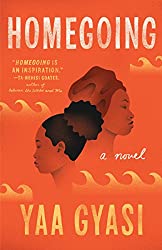
Rating: 8.3/10.
Novel spanning 7 generations, beginning in Ghana around 1760 and following two half-sisters and their family lines. The first sister Effia marries an Englishman in charge of the slave trade; this side of the family remains in Ghana. The other sister Esi is captured and sent on a ship to the Americas; this side of the family experiences slavery and America’s transition out of it.
The British came to Ghana in the 18th century. West Africa was made of many ethnic groups that were often fighting each other, so it was easy for the British to pit the Fante against the Asante and make the Fante capture slaves from inland and sell them for profit. The slaves were kept in a dungeon underneath Cape Coast Castle, until they were ready to board a ship to the Americas.
In Esi’s family line in America, the slaves quickly lose their heritage as families are separated and children forbidden to speak their African languages. Kojo escapes as a baby and settles in Baltimore, but they are fearful of the 1850 Fugitive Slave Act, and his wife disappears, never to be heard from again. His son H is arrested for an arbitrary charge, and made to work as a coal miner, and we can see that the prison system is an extension of slavery. Even after slavery was abolished, black people faced segregation in Harlem and had few opportunities.
I like the multi-generational format, feels like history is one big domino effect where each person’s decisions affect generations to come. The plot feels a bit contrived to fit the format — whenever a girl is introduced, she always ends up eventually being the wife of the chapter’s character. Each generation either only has one child, or the other children are ignored, which is hard to believe since everybody had lots of children during this time. Often characters show up in later chapters as grandmothers, but nobody in the book has a cousin.



